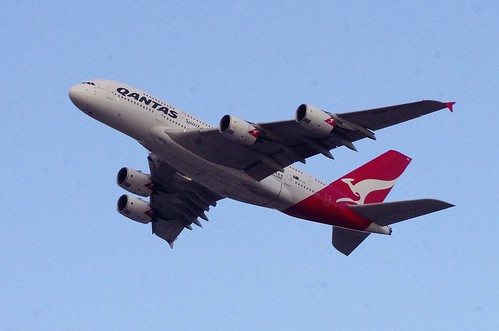Qantas CEO’s exit will barely reduce turbulence
Qantas #Qantas

Alan Joyce, Chief Executive Officer of Qantas, speaks in front of a Qantas 747 jumbo jet, before its last departure from the Sydney Airport in Sydney, Australia, as Qantas retires its remaining Boeing 747 planes early due to the coronavirus disease (COVID-19) pandemic, July 22, 2020. REUTERS/Loren Elliott Acquire Licensing Rights
MELBOURNE, Sept 5 (Reuters Breakingviews) – Qantas (QAN.AX) boss Alan Joyce must wish he had retired on a high back in May when he unveiled Vanessa Hudson as his successor. Instead, his last act after almost 15 years in the pilot’s seat is to leave eight weeks early in the hope that it will help the $6.3 billion Australian airline “accelerate its renewal” after months of scrutiny. Unfortunately, the surprise move is unlikely to have the desired effect.
One reason is because he is leaving much for his replacement to do. Chief among these is dealing with the allegations brought last week by the Australian Competition and Consumer Commission that the airline “engaged in false, misleading or deceptive conduct”. The watchdog asserts that between May and July last year Qantas kept selling tickets on more than 8,000 flights that it had already cancelled; and that it took an average of 18 days to tell ticket holders on more than 10,000 flights that the trips had been cancelled. ACCC Chair Gina Cass-Gottlieb is targeting a fine of at least A$250 million ($162 million), double the previous record, if the court rules against the airline.
That’s not the only extra cost new boss and current finance chief Hudson is likely to face. The board has started considering whether to pay back some of the taxpayer support the Australian government provided during the pandemic, according to The Saturday Paper. And Qantas was already under industry scrutiny for cancelling so many flights. The carrier denies it was trying to stop domestic rivals like Virgin Australia and Regional Express (REX.AX) from being able to secure more routes, but squashing such concerns may now require letting more flights operate at low occupancy or bowing to more competition.
Either choice is likely to make it harder to replicate the record A$2.5 billion pre-tax profit it posted last week for the 12 months to the end of June. And its international operations may come under financial pressure, too. In July Canberra rejected Qatar Airways’ request to add 21 flights a week to key Australian cities. The consumer and political backlash, attributing the decision to protecting Qantas, has been so strong that an about-face could be in the cards.
All that turbulence means more Qantas sacrifices are likely. Clawing back some of Joyce’s and Hudson’s pay seems an obvious place to start; Richard Goyder looks exposed after five years as chair; and the board overall could do with some fresh faces: only one of the eight external directors joined in the past five years. Buckle up for a bumpy fight.
Follow @AntonyMCurrie on X
(The author is a Reuters Breakingviews columnist. The opinions expressed are his own.)
CONTEXT NEWS
Qantas CEO Alan Joyce is stepping down immediately, the company announced on Sept. 5, bringing forward his retirement date by two months to help the company “accelerate its renewal”. He will be succeeded by finance chief Vanessa Hudson, who was named CEO-designate in May. Joyce has been chief executive since 2008.
On Aug. 31 the Australian Competition and Consumer Commission said it was taking Qantas to court alleging it “engaged in false, misleading or deceptive conduct” between May and July 2022 by advertising tickets on more than 8,000 flights that had already been cancelled and by taking an average of 18 days to notify ticket holders on more than 10,000 flights that the trips had been cancelled. Gina Cass-Gottlieb, the watchdog’s chair, is targeting a fine of at least A$250 million ($162 million), she told ABC’s RN radio programme.
Also on Aug. 31, Qantas decided after months of public pressure and a class-action lawsuit to remove the end-2023 expiry date on at least A$470 million of Covid-19-related travel credits. Qantas customers can now get a cash refund, while credits issued by the group’s budget airline, Jetstar, now last indefinitely.
On Aug. 24 Qantas reported record pre-tax earnings for the year to June 30 of A$2.47 billion.
Editing by Una Galani and Katrina Hamlin
Our Standards: The Thomson Reuters Trust Principles.
Opinions expressed are those of the author. They do not reflect the views of Reuters News, which, under the Trust Principles, is committed to integrity, independence, and freedom from bias.